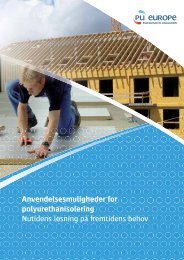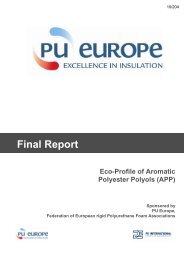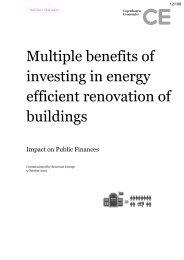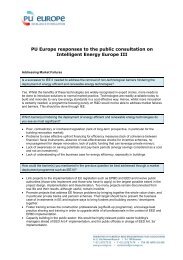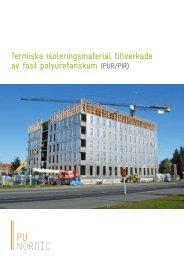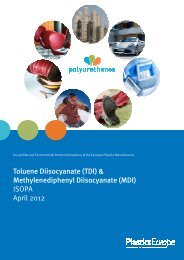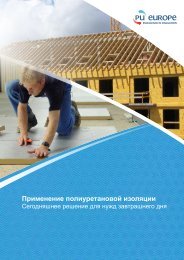BPIE: Europe's buildings under the microscope - PU Europe
BPIE: Europe's buildings under the microscope - PU Europe
BPIE: Europe's buildings under the microscope - PU Europe
Create successful ePaper yourself
Turn your PDF publications into a flip-book with our unique Google optimized e-Paper software.
• A reliable and continuous data collection process of <strong>the</strong> main characteristics of <strong>the</strong> building stock<br />
is a necessary prerequisite for reliable policy making. As this survey has shown <strong>the</strong> levels of data<br />
availability and quality show drastic differences between <strong>the</strong> EU Member States. In order to improve<br />
<strong>the</strong> knowledge level and to be able to take effective measures to improve <strong>the</strong> energy performance<br />
of <strong>buildings</strong>, Member States should collaborate to implement a harmonised standard for collecting<br />
relevant data about <strong>the</strong> <strong>Europe</strong>an building stock.<br />
Financing:<br />
• The success of deep renovation programmes will depend on <strong>the</strong> creation of appropriate financing<br />
schemes, addressing all <strong>the</strong> categories of private and commercial real estate owners as well as<br />
introducing measures using appropriate subsidies, low-interest and longer term loan schemes and<br />
o<strong>the</strong>r financial incentive schemes.<br />
• Financing packages should propose appropriate market instruments tailored to different needs and<br />
able to overcome <strong>the</strong> main market barriers. In addition, <strong>the</strong> renovation programmes should be based<br />
on a preliminary macro-economic analysis in order to ensure <strong>the</strong> sustainability and durability of <strong>the</strong><br />
measure by integrating all <strong>the</strong> benefits, by minimizing <strong>the</strong> costs, by securing <strong>the</strong> programme budget<br />
and by proposing <strong>the</strong> most suitable market instruments. Moreover, <strong>the</strong> incentives should be offered<br />
only for a low-energy standard of <strong>the</strong> renovation, preferably based on ex-ante and ex-post evaluation<br />
of <strong>the</strong> energy performance of <strong>the</strong> building.<br />
• A proper public financing approach may leverage considerable private capital as has been proven by<br />
several successful programmes developed in some <strong>Europe</strong>an countries. Attracting private capital to<br />
invest in building renovation is a key issue of any financing programme that aims to stimulate <strong>the</strong><br />
economy and to transform energy efficiency measures into a sustainable business activity. Governments<br />
should draw up a balance sheet which calculates <strong>the</strong> costs of effective deep renovation incentive<br />
schemes against <strong>the</strong> increased tax revenue from a significant growth of <strong>the</strong> construction industry<br />
(e.g. through VAT, income tax, corporate tax, etc.).<br />
• Relevant national stakeholder need to improve <strong>the</strong>ir knowledge about <strong>the</strong> use of <strong>the</strong> EU Structural<br />
and Regional Funds and <strong>the</strong> EIB financing lines for improving <strong>the</strong> energy performance of <strong>the</strong> <strong>buildings</strong><br />
stock. Investing in <strong>buildings</strong> means investing in <strong>the</strong> development of society.<br />
Training and promotional activities:<br />
• For implementing effective and good quality deep renovation it is necessary to improve <strong>the</strong> skills of <strong>the</strong><br />
building professionals at <strong>the</strong> level of both basic professional education and long-life learning activities.<br />
Therefore, training and educational activities should be developed both in <strong>the</strong> construction sector and<br />
in <strong>the</strong> supply chain industries.<br />
• Promotional and dissemination activities must be an important part of <strong>the</strong> deep building renovation<br />
programmes. The German KfW experience indicates that an important success factor is <strong>the</strong> creation of<br />
an energy efficiency brand 66 , well known and perceived by <strong>the</strong> market.<br />
• Awareness raising and promotional activities should address <strong>the</strong> psychological barriers which exist<br />
concerning deep renovation. A discussion about societal values needs to address behaviour change<br />
to support investment decisions in favour of sustainability ra<strong>the</strong>r than investment decisions driven by<br />
social status factors, or by short term return considerations. Soft measures need to support a shift in<br />
values which can speed up progress towards a more sustainable behaviour by all actors in <strong>the</strong> <strong>buildings</strong><br />
value chain.<br />
66<br />
G. Gumb. Supporting <strong>the</strong> energy efficient rehabilitation of <strong>the</strong> building stock – The German experience. Presentation at <strong>the</strong> <strong>BPIE</strong>’s <strong>Europe</strong>an Roundtable<br />
on financing <strong>buildings</strong> retrofit, Nov. 2010<br />
<strong>Europe</strong>’s <strong>buildings</strong> <strong>under</strong> <strong>the</strong> <strong>microscope</strong> | 127




